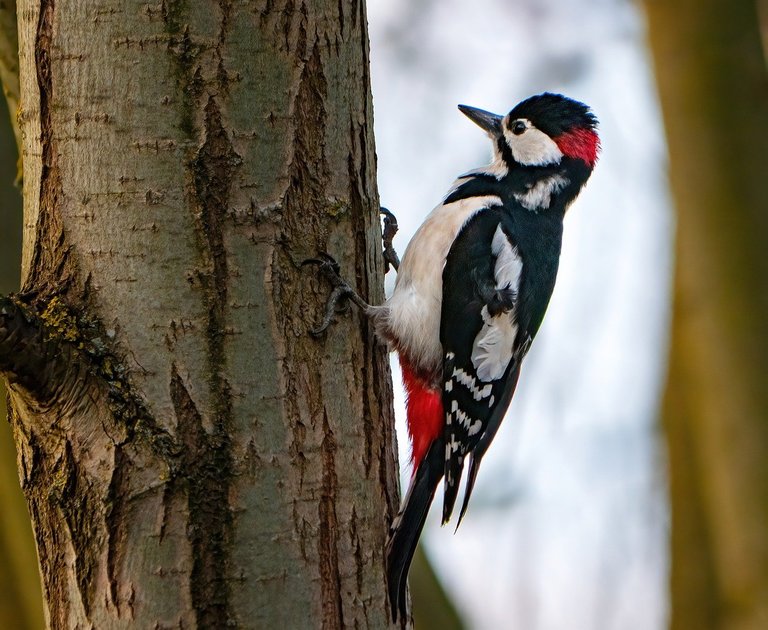Guardian of the Forest: Woodpecker in its Natural Element

The Rhythm of the Forest
The early morning stillness of the ancient woodland was shattered by a sound like rapid gunfire. Rat-tat-tat-tat-tat! The rhythmic drumming echoed through the misty trees, announcing the day's work had begun for Magnus, the Great Spotted Woodpecker.
Clinging vertically to the weathered bark of a silver birch, Magnus paused his hammering. His striking plumage—a patchwork of crisp black and white, accented with a flash of crimson at his nape—caught the first golden rays of sunlight filtering through the canopy. Few creatures in the forest were as visually striking, or as uniquely specialized.
Magnus wasn't merely making noise for the sake of it. Each precise strike of his bill against the tree trunk served multiple purposes: establishing his territory, attracting a potential mate, and most importantly, finding his breakfast. His extraordinary senses could detect the subtle movements of bark beetles and their larvae hidden beneath the surface.
"The humans think I'll give myself a headache," Magnus would joke to the other forest dwellers, if woodpeckers could speak. In reality, his entire body was a marvel of evolutionary engineering. His skull contained special spongy bone that acted as a shock absorber, while his brain was packed tightly in the skull case with minimal cerebrospinal fluid, preventing it from sloshing around during impact. Even the positioning of his brain protected it from the equivalent of 1,200 g-forces with each strike—forces that would leave any human instantly unconscious.
As Magnus worked, his remarkable tongue—a tool that could extend over four inches beyond his bill—snaked into the crevices he created, harpooning insects with its barbed tip. This specialized appendage wrapped around the back of his skull when retracted, an adaptation as bizarre as it was effective.
The old birch tree had been Magnus's favorite feeding spot for months. Now dying, it hosted a buffet of wood-boring insects that were attempting to break down the once-mighty tree. In nature's perfect balance, the tree that had stood for decades would now return its nutrients to the forest floor, with Magnus and countless insects helping the process along.
"The woodpecker is the physician of the woods," an old forester had once told a group of children visiting the nature reserve. "They control insect populations that might otherwise destroy living trees. And those holes they leave behind? They're future apartments for dozens of other species."
Indeed, last spring, Magnus had spent weeks carving out a perfect nesting cavity in an old oak. After raising his brood, the family had moved on, but their former home hadn't remained empty for long. A family of nuthatches had moved in by autumn, grateful for the ready-made shelter as winter approached.
Magnus's work today wasn't just about sustenance; it was his contribution to the complex web that sustained the entire forest ecosystem. His distinctive drumming was both music and function—the sound of specialized excellence in the wild. While other birds might migrate with the changing seasons, Magnus and his kind were year-round residents, adapting to winter by switching from insect prey to nuts, seeds, and berries when necessary.
As the day warmed, a photographer crouched quietly at the forest's edge, camera lens focused on the industrious woodpecker. The human marveled at the bird's zygodactyl feet—two toes pointing forward, two backward—that allowed him to scale vertical surfaces with perfect grip. The photographer's shutter clicked, capturing Magnus in his element, a guardian of the forest performing his ancient role with precision.
In a world increasingly valuing versatility and multi-tasking, Magnus represented something different: the power of specialization. He wasn't trying to soar like the hawks or swim like the kingfishers. Instead, he had perfected his specific niche over millions of years of evolution, becoming essential to the health of these woods precisely because of his unique adaptations.
As Magnus moved to another section of bark, the forest continued its daily rhythm around him—a rhythm he helped maintain with every precise strike of his remarkable bill, a living reminder that sometimes the most valuable contribution comes not from trying to be everything, but from being exactly what you were meant to be.